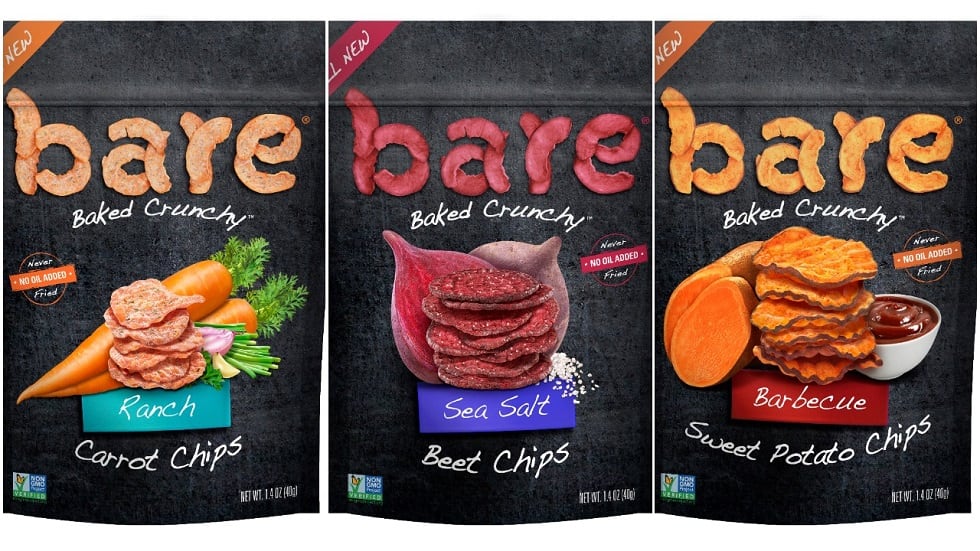Founded by a family of organic farmers in upstate Washington, “we were never conceived to be a fruit and vegetable chips brand [rather than an apple chips producer],” Padki told BakeryandSnacks recently.
“[The farmers] have been growing organic apples and pears for three generations, way before organic food became fashionable,” he said. At one point, the farm owner Eric Strandberg looked for additional ways to preserve his apples. He baked them on his farm and sold them to consumers in Seattle.
“For most of the years, apples constituted a bulk part of our business,” said Padki. “As we expanded, we started sourcing ingredients from other regions, and diversified into more lines, including coconut and banana.
“Certain vegetables and fruit only come from specific parts of the world. But we’re still very much connected with the Washington apple farms,” he added.
First baked vegetable chips line
Bare Snacks recently introduced its first baked vegetable chips line after producing fruit chips for years in response to the increasing consumer demand for vegetables.
The line includes sea salt- and salt and vinegar-flavored beet chips, sea salt- and ranch-flavored carrot chips, as well as sea salt- and barbecue-flavored sweet potato chips, said the company.
Each bag retails for $4.29 and is available in major US retailers such as Kroger, Target, Wegmans, Safeway, Ahold and online via Amazon.

“Overall, there has been a strong desire from the consumer to eat more vegetables, and we’re looking at how we can help Americans increase that diet,” said Padki. “The reception from our retail partners has been very strong.”
However, Bare Snacks knew it was going to face headwind from its competitors such as Terra Chips (owned by Hain Celestial) upon entering the vegetable chips category.
“[As for competition], I’m not talking about the traditional potato chips even though they have their own challenges among consumers, including their high oil and fat levels – a typical fried potato chip has around 25% to 30% of fat, so we do not want to go in that direction,” Padki explained.
“Root vegetables make up 90% of the veggie chips on the market,” he added.
“Instead of educating consumers about exotic vegetables, we wanted to enable them to enjoy what they are already familiar with, as [changing] the consumer's eating habit is nearly impossible.”
In addition to being a good fiber source, naturally gluten-free, Padkis said Bare Snacks chose carrots as very few manufacturers use it to make chips.
“There are some small, niche brands who use carrots [for chip products], but these tend to be fried items,” he said.
‘Our investors are deeply committed to the health and wellness space…’
Consumer demand for healthy snacks is a key driver fueling Bare Snacks’ growth, said Padki.
A new Euromonitor report showed the US vegetable, pulse and bread chips are expected to post value CAGR of 3% at constant 2017 prices over the next five years, reaching $1.1bn, while fruit snacks are expected grow 1.3% in sales value year-over-year, reaching $2.48bn by 2022.
According to the data provider, “pulse-based brands like Calbee Harvest Snaps, Beanitos and Plentils will continue to grow thanks to their high protein and fiber content but also because they are low in sodium and fat."
But another indispensable part of Bare Snacks’ business growth strategy is having support from a group of mission-driven investors, Padki noted.
“Our investors are deeply committed to the health and wellness space, not just coming on board for financial reasons,” he said.
The company has also been approached by large CPG companies for potential acquisition, according to Padki.
“Acquisition is nothing new. As the brand continues to gain momentum and to catch a lot of attention from consumers, there has been a lot of interest,” he said.
However, Bare Snacks’ focus will not deviate from the “simplicity proposition” of its products, added Padki. “When [the acquisition] happens, it happens, but we’re building the business for our consumers. We stay true to our mission,” he said.
Padki said Bare Snacks has only scratched the surface of fruit and vegetables and is going to explore other options.
“There’s still a lot of space for us to grow. We want to look at responsible innovations because that’s our DNA,” he said.
